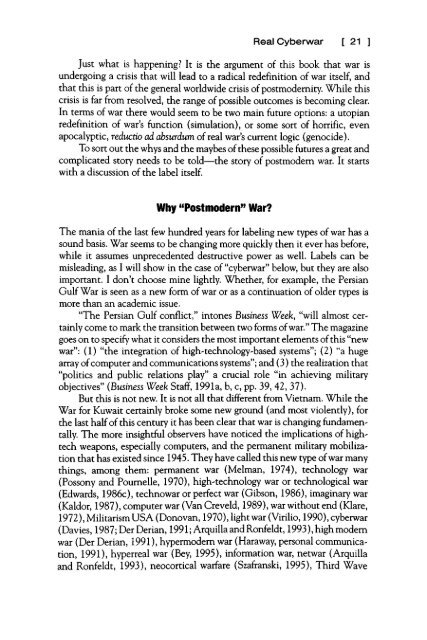entire book - Chris Hables Gray
entire book - Chris Hables Gray
entire book - Chris Hables Gray
Create successful ePaper yourself
Turn your PDF publications into a flip-book with our unique Google optimized e-Paper software.
Real Cyberwar [ 21 ]<br />
Just what is happening? It is the argument of this <strong>book</strong> that war is<br />
undergoing a crisis that will lead to a radical redefinition of war itself, and<br />
that this is part of the general worldwide crisis of postmodemity. While this<br />
crisis is far from resolved, the range of possible outcomes is becoming clear.<br />
In terms of war there would seem to be two main future options: a Utopian<br />
redefinition of war's function (simulation), or some sort of horrific, even<br />
apocalyptic, reductio ad absurdum of real war's current logic (genocide).<br />
To sort out the whys and the maybes of these possible futures a great and<br />
complicated story needs to be told—the story of postmodern war. It starts<br />
with a discussion of the label itself.<br />
Why "Postmodern" War?<br />
The mania of the last few hundred years for labeling new types of war has a<br />
sound basis. War seems to be changing more quickly then it ever has before,<br />
while it assumes unprecedented destructive power as well. Labels can be<br />
misleading, as I will show in the case of "cyberwar" below, but they are also<br />
important. I don't choose mine lightly. Whether, for example, the Persian<br />
Gulf War is seen as a new form of war or as a continuation of older types is<br />
more than an academic issue.<br />
"The Persian Gulf conflict," intones Business Week, "will almost certainly<br />
come to mark the transition between two forms of war." The magazine<br />
goes on to specify what it considers the most important elements of this "new<br />
war": (1) "the integration of high-technology-based systems"; (2) "a huge<br />
array of computer and communications systems"; and (3) the realization that<br />
"politics and public relations play" a crucial role "in achieving military<br />
objectives" (Business Week Staff, 1991a, b, c, pp. 39, 42, 37).<br />
But this is not new. It is not all that different from Vietnam. While the<br />
War for Kuwait certainly broke some new ground (and most violently), for<br />
the last half of this century it has been clear that war is changing fundamentally.<br />
The more insightful observers have noticed the implications of hightech<br />
weapons, especially computers, and the permanent military mobilization<br />
that has existed since 1945. They have called this new type of war many<br />
things, among them: permanent war (Melman, 1974), technology war<br />
(Possony and Pournelle, 1970), high-technology war or technological war<br />
(Edwards, 1986c), technowar or perfect war (Gibson, 1986), imaginary war<br />
(Kaldor, 1987), computer war (Van Creveld, 1989), war without end (Klare,<br />
1972), Militarism USA (Donovan, 1970), light war (Virilio, 1990), cyberwar<br />
(Davies, 1987;DerDerian, 1991; Arquilla and Ronfeldt, 1993), high modern<br />
war (Der Derian, 1991), hypermodern war (Haraway, personal communication,<br />
1991), hyperreal war (Bey, 1995), information war, netwar (Arquilla<br />
and Ronfeldt, 1993), neocortical warfare (Szafranski, 1995), Third Wave








